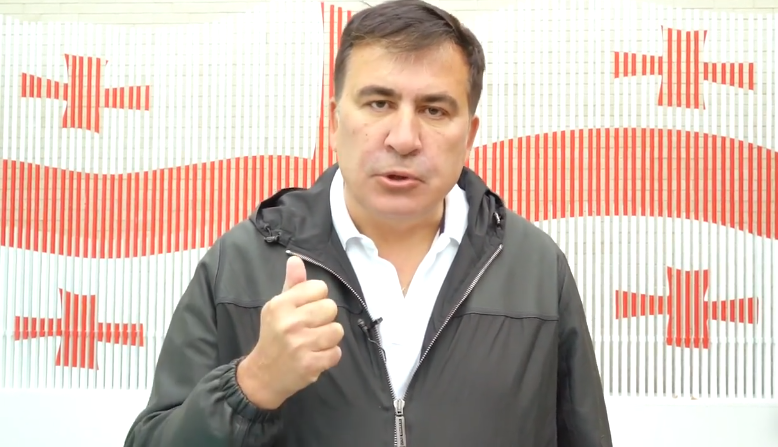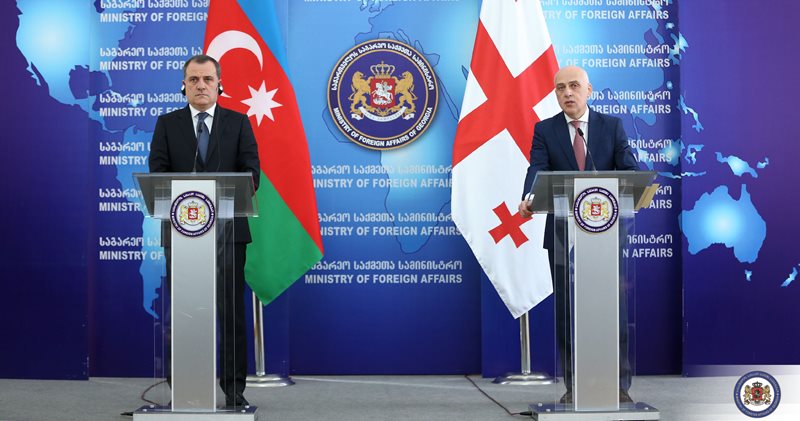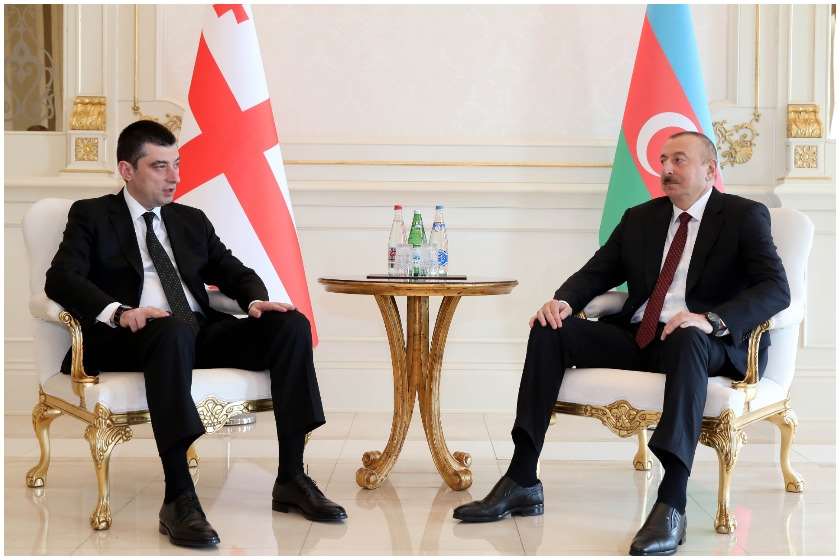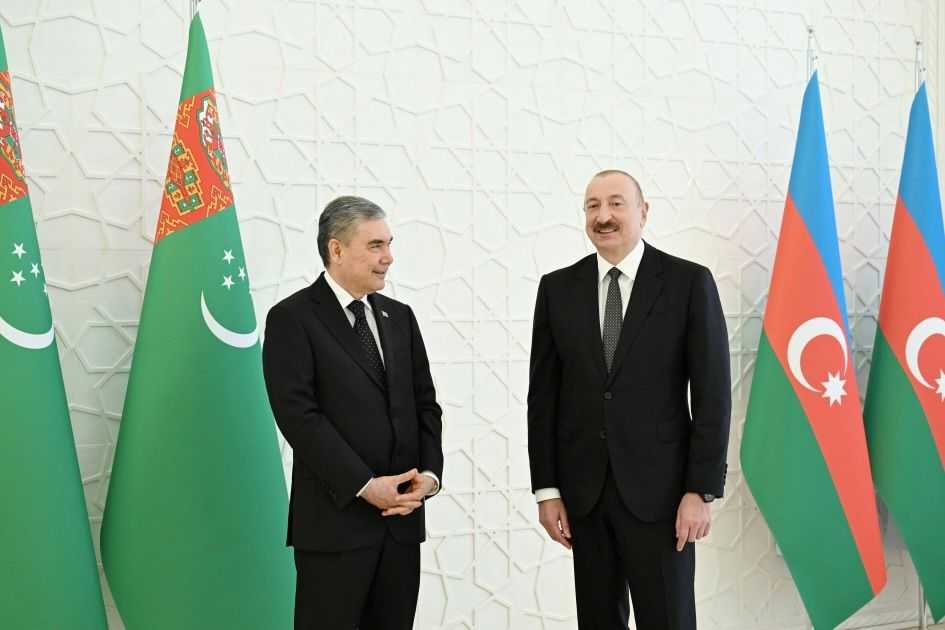
A month before parliamentary elections, the Georgian authorities have launched an investigation into an ‘illegal concession of territories’ to a neighbouring country under the previous government.
On 5 October, former President Mikheil Saakashvili accused the government of conducting a sham investigation by accusing him of giving away Georgian territories to Azerbaijan in the mid-2000s.
The Georgian Prosecutor’s Office announced an investigation looking into the work of members of the Government Commission on Delimitation and Demarcation of State Borders on 29 September.
The authorities said they were investigating ‘individual experts’ of the commission who they said may have transferred ‘a part of the territory of Georgia to a foreign country’, a crime punishable by 15–20 years in prison.
On 1 October, Georgian investigators searched the flats of Natalia Ilichova and Iveri Melashvili, former members of the commission.
Saakashvili, who set up the 10-person commission including Melashvili and Ilichova in 2006, insisted on Monday that his government actually came close to a final agreement on delimiting the border with Azerbaijan.
Saakashvili also insisted that Georgia’s relations with Azerbaijan had ‘reached their minimum’ under Ivanishvili.

‘Any Georgian could enter Gareja, pray in Gareja… and it was lost during Ivanishvili’, Saakashvili added in a video address on Facebook.
The Davit Gareja Monastery Complex is part of 180 kilometres of undemarcated border (out of 480) between Azerbaijan and Georgia.
In recent years, Azerbaijan has claimed the area which they call Keshikchidagh is a site of ancient Caucasian Albanian origin and part of Azerbaijan’s cultural heritage; Georgian authorities have insisted it is a historical Georgian Orthodox area.
While the Prosecutor’s Office did not specify which territories were ‘transferred’ nor to which country, several statements by Georgian Dream party officials confirmed that the Davit Gareja monastery was at the heart of the new probe.
‘The right map’
Georgian Foreign Minister Davit Zalkaliani claimed days before the announcement of the investigation that they were studying new cartographic materials he said they had recently acquired.
‘I don’t rule out that the analysis of these materials leads to the need for revision of the agreement achieved in 2006–2007’, Zalkaliani said during a briefing with his Azerbaijani counterpart, Jeyhun Bayramov, in Tbilisi on 24 September.

The Chair of the Military and Security Committee of the outgoing parliament, Irakli Sesiashvili, claimed only that they had acquired the ‘original’ 1938 maps of the Azerbaijani-Georgian border.
According to Sesiashvili, the Commission during Saakashvili’s rule failed to track ‘or ignored’ these materials instead of using them to gain a better agreement with Azerbaijan.
The content of this agreement has so far not been made public.
Georgian Orthodox Church: ‘a treacherous agreement’
In several recent statements, the Patriarchate of the Georgian Orthodox Church has confirmed that they were not happy with some — yet still unspecified — decisions made by the Commission earlier.
‘The Commission assigned these territories to our neighbouring state’, Andria Jaghmaidze, the Church’s spokesperson claimed on 5 October, calling the Commission’s earlier work ‘treacherous’.
Earlier, the Church sent strong signals to the current government that they expected the dispute that reemerged with Azerbaijan last year to be solved soon.

Last October, before Georgian PM Giorgi Gakharia met with Azerbaijan’s President Ilham Aliyev in Baku, the Patriarchate warned they would ‘not put up with’ restricted access to the Udabno and Chichkhituri monasteries.
The Church underlined that those monasteries were under Georgian control before the spring of 2019.
The Georgian-Azerbaijani dispute
The controversy over ‘losing’ part of the Davit Gareja Monastery complex reemerged last spring and continued to gain public attention until anti-coronavirus restrictions culminated in a state of emergency in late March.
The controversy rapidly reemerged last year after Azerbaijan restricted Georgian parishioners and tourists from visiting several of the monasteries within the Complex in the spring 2019.
The move followed Georgian president Salome Zurabishvili’s trip to the site that month. Earlier, Zurabishvili also raised the issue while meeting Azerbaijani President Ilham Aliyev in Baku in February.
Loss of access to the two monasteries triggered frequent rallies and pilgrimages to Davit Gareja by various Georgian groups, something that was countered with groups of Azerbaijanis also visiting the site with Azerbaijani flags.

Earlier, a group of Georgian ultraconservative activists, including Davit Gareja Protection Committee members, campaigned for the release of the ‘defender of Davit Gareja’ Giorgi Ichukaidze, who was detained for illegal arms possession in January.
On 14 January, Ichukaidze, 30, briefly took Georgian guards hostage at Davit Gareja demanding they let him cross into the disputed section of the border. Ichukaidze eventually successfully pleaded mentally unfit for a trial.
In mid-April, Georgia’s State Security Service (SSG) published a report saying that certain groups ‘masquerading as protecting national values’ had waged a ‘destructive campaign’ over Davit Gareja which they said ‘endangered’ Georgia’s strategic partnership with Azerbaijan.
[Read more on OC Media: Opinion | Only Moscow benefits from rising Tbilisi-Baku tensions]







